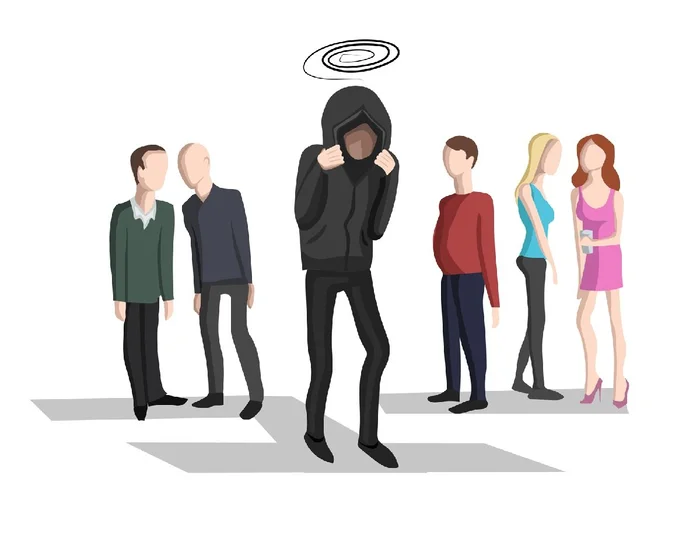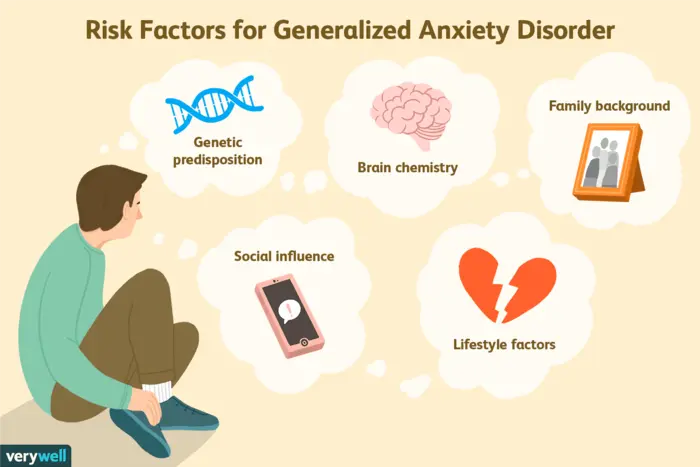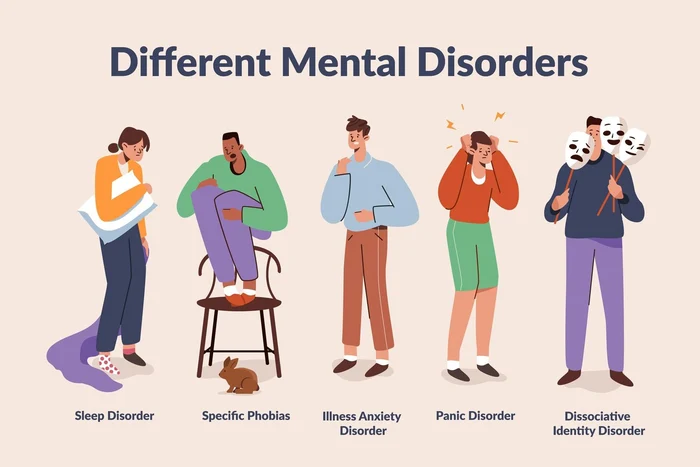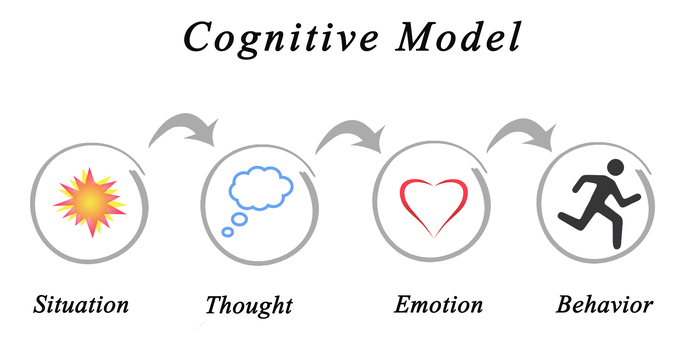The Phobia social
Recognizing Symptoms and Finding Support
The Phobia Social : Signs and Symptoms of recognizing

When someone with social phobia finds themselves in a situation they fear, they may experience intense anxiety. These feelings can manifest in various ways, such as:
Blushing: Their face may turn red, indicating heightened embarrassment or nervousness.
Trembling: They might feel their body shake or tremble due to heightened stress.
Feeling Speechless: It's common to feel like you have nothing to say, even if you want to participate.
Increased Heart Rate: Their heart might beat faster than usual, a physical response to stress.
Shallow Breathing: Breathing may become quick and shallow, reflecting heightened anxiety levels.
Sweaty Palms: Their hands may become sweaty due to nervousness. Nausea: They may feel queasy or sick to their stomach.
Muscle Tension: The body might feel tense or rigid, a result of stress.
Dry Throat: They may experience dryness in their throat due to nervousness.
Stomach Discomfort: They might feel pain or discomfort in their stomach area.
Feeling Dizzy: They might feel light-headed or dizzy, possibly due to hyperventilation.
Self-Doubt and Uncertainty: Negative thoughts and doubts about oneself can arise, such as feeling inadequate or incompetent.
Negative Thoughts: They may have negative thoughts, such as believing they're embarrassing themselves.
Difficulty Concentrating: It becomes challenging to focus on anything other than their anxiety and negative thoughts.
Urge to Escape: There's a strong desire to leave the situation as quickly as possible.
Realization of Irrationality: Despite recognizing that their feelings are irrational, it's challenging to control them.
These symptoms can significantly impact a person's ability to socialize and function in various social situations.
How common is social anxiety disorder (The Phobia Social)?
The phobia social is more common than you might think. About 5% to 10% of people worldwide experience it. That makes it the third most prevalent mental health issue, after substance use disorder and depression.
The Factors That Can Lead to The Phobia Social

Ever wonder why some people struggle with social anxiety more than others? Let's take a look at some of the things that can increase the chances of developing social anxiety disorder:
Family Connections
Family History: If your parents or siblings have dealt with social anxiety, you might be more likely to experience it too. It's like passing down a trait through generations.
Life's Ups and Downs
Tough Times: Kids who've been through rough patches like teasing, bullying, or family conflicts might find themselves grappling with social anxiety. It's like those experiences leave a mark on your confidence.
Personality Traits: Being naturally shy or reserved can make you more susceptible to social anxiety. It's like feeling a bit nervous when stepping into unfamiliar territory.
Life's Big Moments
New Challenges: Social anxiety often kicks in during those big moments in life, like starting high school or entering the workforce. It's like the pressure cooker of new experiences triggering those anxious feelings.
Standing Out: Sometimes, having a noticeable feature or condition, like a facial disfigurement or stutter, can make you feel more self-conscious and trigger social anxiety.
Can Social Anxiety Disorder Be Diagnosed?
Yes, there are tests and tools that healthcare providers and psychologists use to understand what you're going through. These usually involve a series of questions to figure out if you might have social anxiety disorder. After looking at your answers, your healthcare provider can then decide if you have the phobia social or not.
Are there different types of social anxiety?
Absolutely! The phocia social isn't a one-size-fits-all deal. It's more like a spectrum of nervousness that varies from person to person. So, let's dive into the different levels:
Jittery vibes: Picture this – you're at a party, and your palms get a bit sweaty, or you're up on stage giving a presentation, and your heart starts racing. That's like the mild version of social anxiety. It's there, but you can handle it like a champ!
Navigating the nerves: Now, imagine you're at a bigger gathering, and suddenly, those nerves kick up a notch. You might still make it through, but it's a bit more of a struggle. Some events might feel doable, while others have you thinking twice.
Full-on anxiety alert: Then, there's the extreme end of the spectrum. Think heart-pounding, stomach-churning, can't-breathe kind of anxiety. It's like your brain hits the panic button, and social situations become a no-go zone.
No matter where you land on the social anxiety scale, know that it's okay! Everyone feels nervous sometimes, and there's no shame in asking for help if you need it. So, embrace your quirks, own your nerves, and remember – you're not alone on this journey!"

Dealing with Social Anxiety: What You Need to Know
Having social anxiety can be really tough. It's more than just feeling shy; it's about feeling super nervous in social situations. Here are some of the big problems it can cause:
Feeling Overwhelmed
Using Alcohol: Some folks might drink alcohol to try to feel better in social situations.
Drinking Too Much: But drinking too much can lead to its own set of problems. Taking
Drugs: Some people might also use drugs, even prescription ones, to try to cope.
Struggles in Life
Trouble with Friends: It's hard to make friends or keep them when you're always feeling anxious.
Problems at Work or School: Social anxiety can make it tough to concentrate, which can affect your performance.
Feeling Really Sad: It's common to feel really down or hopeless when you have the phobia social.
Feeling Really Alone
Thinking Bad Thoughts: In really tough cases, some people might even have thoughts of hurting themselves.
Being Alone: Social anxiety can make you want to avoid people altogether, which can be really lonely.
Staying Home: You might even feel like you don't want to leave your house at all.
How to Help Yourself and Others with Social Anxiety
Living with social anxiety can feel really tough, but there are ways to make it a bit easier. Here's what you can do:
Learn More
Get Informed: Take some time to find out about social anxiety. Learn what it is, what causes it, and how people deal with it. The more you know, the better you can handle it.
Talk About It
Share Your Feelings: If you're feeling anxious, don't keep it to yourself. Talk to someone you trust, like a friend or family member. They can offer support and help you feel less alone.
Be a Good Listener: If someone you know is struggling with social anxiety, be there for them. Listen to what they have to say without judging them. Sometimes, just having someone to talk to can make a big difference.
Get Help When Needed
Recognize When It's Serious: If social anxiety is making it hard for you to do everyday things, like going to school or work, it's time to ask for help.
Reach Out: Talk to a doctor or therapist who knows about anxiety. They can give you tips and tricks to manage your feelings and help you feel better.
Ways to Beat The Phobia Social

Struggling with social anxiety? You're not alone. Luckily, there are treatments that can help you overcome it. Here are your main options:
Talk Therapy
Chat it Out: Ever heard of cognitive behavioural therapy (CBT)? It's like having a heart-to-heart with a therapist who helps you figure out your thoughts and behaviours. You can do it one-on-one, in a group, or even involve your parents or carers.
DIY Therapy: Prefer to work through things on your own? Guided self-help might be the way to go. You'll use a workbook or an online course based on CBT, with a therapist there to lend a helping hand when you need it.
Medication
Pills to the Rescue: If therapy alone isn't cutting it, your doctor might suggest antidepressants, like escitalopram or sertraline. They're like little mood boosters that can help take the edge off the phobia social. But they're usually not recommended for kids and teens.
Finding What Works for You
Trial and Error: CBT is generally considered the best treatment, but other treatments may help if it does not work or you do not want to try it. Some people need to try a combination of treatments.
Conclusion
Recognizing and addressing social anxiety is crucial for improving your quality of life. By understanding the signs of social phobia and seeking support when needed, you can take control of your anxiety and start living more confidently. Remember, you're not alone in this journey, and help is available. With the right support and strategies, you can overcome social anxiety and thrive in social situations.
FAQs
Q: Can social phobia be cured?
While there is no definitive "cure" for social phobia, many people experience significant improvement with treatment. With therapy and support, individuals can learn to manage their symptoms effectively.
Q: Can children have social phobia?
Yes, social phobia can develop in childhood or adolescence. Children with social phobia may experience excessive fear or anxiety in social situations, leading to avoidance behavior and impairment in social functioning.
Q: Can social phobia lead to other mental health issues?
Yes, untreated social phobia can increase the risk of developing other mental health conditions, such as depression or substance abuse disorders. Addressing social phobia early can help prevent the onset of additional issues.
Q: Is social phobia the same as shyness?
No, social phobia is not the same as shyness. While shyness may cause discomfort in social situations, social phobia involves an intense and persistent fear that significantly interferes with daily life.